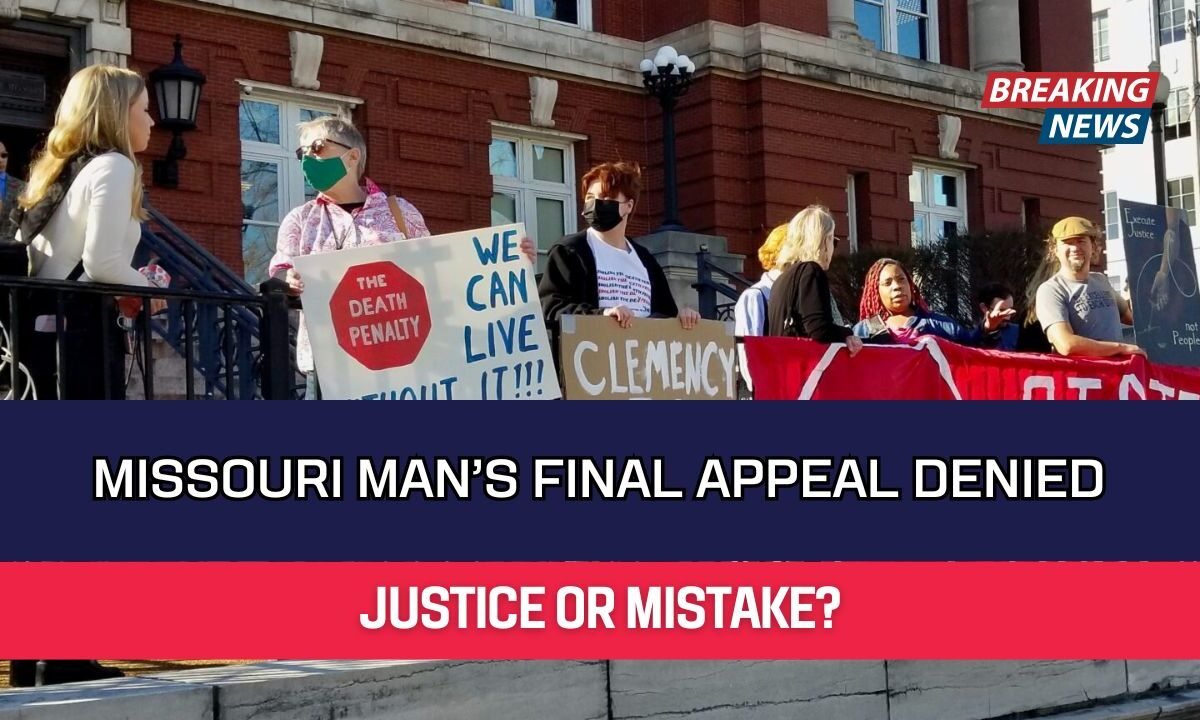Missouri Man’s Final Appeal: A man in Missouri who says he is innocent is scheduled to be executed at 6 p.m. on Tuesday. His legal team has asked for last-minute help — to let his daughters pray with him in the execution chamber — but those requests have been denied.
This case has stirred strong questions about fairness, religion, and how death sentences are decided. Let’s break down the story.
What Is the Case About?
The Accused: Lance Shockley
- Lance Shockley was convicted in 2009 for murdering Missouri State Highway Patrol Sergeant Carl DeWayne Graham Jr.
- Graham had been found shot to death at his home’s driveway in March 2005. He was investigating the role of Shockley in a deadly 2004 drunk driving accident, which prosecutors said gave Shockley a motive for murder.
Controversial Death Sentence
- Shockley’s death sentence came not from a jury verdict for death, but from a judge’s decision because the jury could not agree on a death penalty.
- Unlike many states, in Missouri (and only one other state, Indiana), a judge can impose the death penalty even when the jury is deadlocked on sentencing.
- In most states, if the jury cannot unanimously agree, the defendant gets life in prison instead.
Legal Battles in the Final Hours
Denial of Clemency and Appeals
- On Monday, Governor Mike Kehoe denied clemency (the power to spare the man’s life).
- The U.S. Eighth Circuit Court of Appeals refused a request to delay the execution.
- Shockley’s attorneys are now considering asking the U.S. Supreme Court to step in.
Religious Request: Prayer in the Chamber
- Shockley’s daughters, who are ordained ministers, asked permission to pray and lay hands on their father during the execution.
- Judges denied this request. In his ruling, Judge David Stras said allowing family inside could be dangerous and would not cause a “substantial burden” on religious rights.
- He said the daughters could pray behind a glass window, not in the room.
Official Positions
- The Department of Corrections allowed a spiritual advisor but said not family members when an execution is scheduled.
- Keystone officials said all legal stages — including the Missouri Supreme Court, federal district court, Eighth Circuit, and U.S. Supreme Court — have already reviewed the case and left the death sentence intact.
- In his statement, Kehoe said Shockley got “every legal protection” in both Missouri and the U.S. Constitution.
Key Legal and Ethical Questions
| Issue | What It Means | Why It Matters |
|---|---|---|
| Innocence claim | Shockley says he is innocent | If true, executing him would be a grave error |
| Judge-imposed death sentence | Jury could not decide, so judge steps in | Raises fairness concerns |
| Religious rights in execution | Daughters want to pray in the room | Test of religious freedom under pressure |
| Final appeals | Last chance to stop execution | Supreme Court might intervene at the last minute |
| Precedent & policy | Missouri law allows judge sentencing | Only one of two states with this rule |
Why This Case Is Different
- Judge-Only Death Sentence
The fact that a judge — not the jury — imposed death is rare. In most U.S. states, a deadlocked jury means a life sentence. Missouri’s rules make this case special. - Religious Permission Controversy
Letting family inside an execution chamber for prayer would be unprecedented. The court said it could pose safety risks and that the request did not create a compelling religious hardship. - Last-Minute Legal Steps
With appeals exhausted, this is now a heart-pounding race. Shockley’s team may turn to the Supreme Court, but those justices may or may not act at the final hour.
What Happens Next?
- If the U.S. Supreme Court takes up the case, it could issue a stay (delay).
- If not, the execution proceeds at 6 p.m. Tuesday as scheduled.
- Meanwhile, Shockley’s team continues to press for reconsideration based on religious freedom and the claim that two jurors actually voted for life during sentencing deliberations.
This is a tense, last-minute fight over a man’s life. Lance Shockley — who claims innocence — is set to be executed by a judge’s decision, without a jury consensus on death.
His daughters asked to pray with him in the chamber but were denied, raising serious questions about religious rights and fairness.
His attorneys are pushing all remaining legal options, including an appeal to the U.S. Supreme Court, hoping to delay or stop what many see as an irreversible act. The outcome could force wider debate about how justice is done in capital punishment cases.



